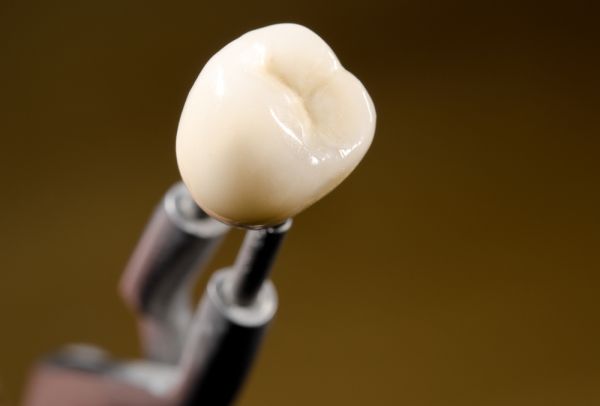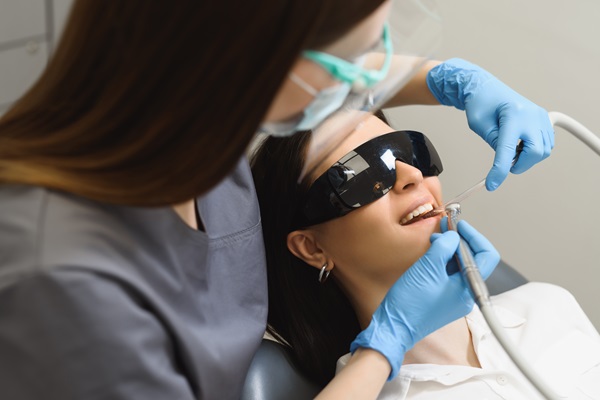How to Take Care of Crowns After Crown Placement on Implants

You have undergone a crown placement procedure, and you want your new restoration to last. Dental crowns typically last for 5-15 years, but you can increase the odds of keeping your restoration longer by caring for it properly. Caring for a crown is not difficult, and once you get into a routine, it will become second nature.
How to care for dental crowns after a crown placement
People should begin caring for dental crowns right after the crown placement. They must continue a proper care routine for the lifetime of the crown.
Right after the procedure
Many people experience sensitivity right after getting a crown placed. Patients should brush with sensitive toothpaste immediately following the procedure. Patients can switch to regular toothpaste after the sensitivity subsides.
Brushing and flossing
Brushing and flossing should be part of every oral hygiene routine, including when people have crowns. Pay special attention to the gum tissue surrounding the crown when brushing. Bacteria can get in between the implant and crown through the gums, so it is critical to remove these.
Dentists might recommend patients use fluoride-based toothpaste to care for crowns. This strengthens the enamel and makes the root less likely to decay. Dentists examine patients’ oral histories before recommending this type of toothpaste. Those who have a long history of dental decay or have gum disease are good candidates for fluoride-based toothpaste.
Patients should floss daily with dental floss made for implants. Those who have trouble properly using dental floss can use a waterpik.
Avoid foods that harm dental restorations
Sticky and sugary foods should be avoided after crown placement. Sticky foods attach to dental crowns and can cause them to fail. Sugary foods create a buildup of bacteria, making it easier for the tooth under the crown to decay. This can also cause the crown and implant to fail.
Wear a mouthguard
Dental crowns are durable, but these restorations can be damaged when people grind their teeth at night. People who have bruxism are encouraged to get a mouthguard fitted by the dentist. Wearing a mouthguard at night protects the dental crowns and the remaining teeth.
Go to the dentist every six months
Some people with a single restoration might only need to go to the dentist one time a year. Most people with implants and crowns need to go at least twice a year, though. The dentist can check for gum problems, signs of decay and issues with the restoration. Many problems can be fixed if caught quickly. Regular dental checkups allow dentists to find problems they turn into serious issues.
Take care of your crowns
You might experience some sensitivity right after getting your crown, so take special care and use a sensitive toothpaste if necessary. Then, you can switch to regular toothpaste and use dental floss made for implants. Avoid sticky and sugary foods and wear a mouthguard if you grind your teeth at night. Also, make sure to visit your dentist every six months. Your dentist will check your restorations and make sure there is not any damage.
Request an appointment here: https://sandimassedation.com or call San Dimas Family and Sedation Dentistry at (909) 740-8294 for an appointment in our San Dimas office.
Check out what others are saying about our services on Yelp: Read our Yelp reviews.
Recent Posts
When people experience cavities, the resulting pain can interfere with eating and flare up when the cavity comes in contact with hot or cold foods. A laser dentist can assist with repairing cavities depending on their severity and in a way that reduces the pain typically associated with such a procedure. Those who want to…
It is important to treat a dental emergency as soon as possible to prevent any concern from worsening. This review discusses the different types of dental emergencies and how you can properly treat them.A dental emergency does not improve on its own. Fortunately, emergency dentists are able to treat oral health and dental trauma concerns…
Almost everyone experiences a stained tooth throughout their lives, which is where cosmetic dentistry can be helpful. There are many different treatment options that fall under the cosmetic dentistry category, all of which can be used to transform, restore or renew teeth that are not in optimal condition. Stains often result in embarrassment or shame;…
Many patients who have missing teeth consider dental implants as an option to restore the look and function of their smile. When deciding whether to have the procedure, it is important to learn as much as possible about the treatment.There are a variety of things patients should know about dental implants when considering the procedure.Dental…


